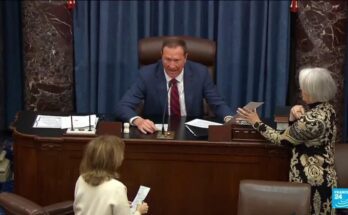Perhaps she had already established herself as one of the most influential artists in the history of music, at least in Spain. But since he started running along Madrid’s Gran Vía to present his new album LUXRosalía has never stopped being the epicenter of every after-dinner party, set or radio studio. The whirlwind of genres, registers or the 14 languages that make up his new masterpiece have left no one indifferent. Nor are the liturgical echoes that weave the 18 songs that make up the album. And the bishop of Sant Feliu de Llobregat (Barcelona), Xabier Gómez García, wrote an open letter to the Catalan singer on the Sunday page. “We are so far away… I am writing to you like someone who throws a message in a bottle into the sea; who knows if it will reach you”, we read in the first paragraph.
Wow, it’s here. According to what Rosalía said on the program Monday evening The revoltfrom RTVE, the grandmother called her excitedly because the bishop had mentioned her on the Sunday news. An interview in which she appeared with a rosary around her neck dispelled any doubts about the spirituality surrounding the singer.
Regardless of the controversy circulating on social networks regarding the singing of the Escolanía de Montserrat in Spanish, the bishop surrenders to the artist of Baix Llobregat. “I can’t understand you, but I would like to. Your art, hypnotically eclectic and performative, and you yourself, raise questions in me,” the letter continues.
Gómez goes beyond the formal aspects LUX and wonders what Rosalía’s relationship with faith is: “Perhaps it is not necessary to understand it. But I wonder what is in you, in your inner world, in this phase or cycle of your life as a woman and artist.”
And the artist wanted to capture in his texts that spirituality is imbued with doubts, but at the same time with certainties, something that disconcerted the bishop: «When we talk about a thirst that the world cannot satisfy and that only God can fill that void, the search for meaning that runs through the film comes to mind. Andrei Rublevby Tarkovsky. Like him, it seems that you experience art as a spiritual journey, where creation is a form of pilgrimage towards what transcends. But you haven’t just done it… and without casting off the moorings it won’t be easy to reach the desired port. If I wanted to get there,” he continues.
The letter, which can be listened to thanks to a QR code, ends with a message of hope for the bishop himself. “Your lyrics baffle me, but they also open up the possibility of a dialogue about the complexity of the human experience. You understand love as a force that can be painful, liberating, even divine. Your art is a space where vulnerability and strength coexist, where desire and faith can meet.”
Gómez completes his letter with an invitation to the artist to delve into faith as a counterbalance to the noise surrounding a person known throughout the world as Rosalía. “There are silences that speak more than a thousand songs. Who knows if, when everything is silent, you find peace or simply more noise. Maybe the answer is not outside, but inside you”, he concludes.



